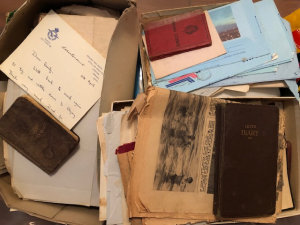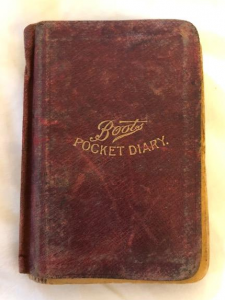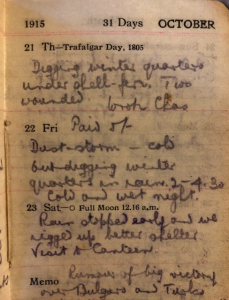
I am not sure why my family decided to elect me – maybe because I majored in History? – but I am the “family archivist.” What does that entail exactly? I have the responsibility to decide what is kept and what is thrown away in the box of family photographs, letters, and journals. I organize this material in a way that makes the most sense to me, so future generations of the Cann family can look at them and understand their history. I am also proud to share my findings with family members and write about the stories that I discover.
The first step of my process is to read. Read everything! I was excited to learn more about the lives of family members. And none of their lives were boring. I bet everyone, given access to family documents, would find that their ancestors led amazing lives.

How do I decide what to keep? It’s especially difficult because, after all, it is your family, and everything is sentimental – well, maybe not the thirty photographs your grandfather took of trees in Africa. Between the stacks of photos are love letters, wedding photographs, drivers’ licenses from the 1950s, and diaries which I cherish dearly. Some of the diaries are written about the daily life of a stay-at-home mother, while others describe the experiences of a soldier during World War I. And to my astonishment, all these items were found in my grandparents’ messy closet, in a small village west of London.
I have always loved hearing stories about family members’ lives. Often, they would pause while telling me a fascinating story and say, “I’m sorry, you probably don’t want to hear this,” and I would reply, “Are you kidding? I love it. I want to hear everything.” An important part of preserving family history can be done by connecting oral histories and documents to create a narrative for the rest of the family to enjoy. I find the best way to do that is to write. Two pages or forty pages. Since I am so used to writing papers for college courses, I write my family’s history in essay format (narrative: not first-person, with footnote references!).
My favorite college paper is titled “The Blitz’s Influence on Juvenile Literature.” I mentioned my grandfather, who was sent to Yorkshire by his mother to escape the Luftwaffe’s bombs.
In college, I chose paper topics that allowed me to write my family history within the paragraphs, to use as evidence for my opinions. I find that researching the time period and locations where my family lived is a great way to learn more about their personal lives as well as an important addition to my family history. My favorite college paper is titled “The Blitz’s Influence on Juvenile Literature.” I mentioned my grandfather, who was sent to Yorkshire by his mother to escape the Luftwaffe’s bombs. My latest endeavor is studying the American Gold Rush and linking my ancestor into the narrative. He was an Italian immigrant who travelled to Montana to find his fortune as a miner, while the rest of the family stayed in Massachusetts.

I want to be able to understand what is happening in diaries and documents, so I like to read about the historical background of the time period, to better comprehend events within each town in which my ancestors lived. I find that specific dates are the most important. After all, there might be a newspaper article that helps fill in the blanks of what’s happening in the neighborhood, like a theft at a local store or a marriage in the town center. All I have to do is read along to a diary or a letter while looking up dates on my laptop to gain an understanding of the time. You may find that your ancestor’s actions or feelings were directly caused by a major historical event, and that insight is priceless.
Being the family archivist is such an important role for myself, my family, and our history in general. Keeping your ancestors’ lives, feelings, and thoughts alive are so important, and, for me, a joy.
How I envy all those diaries, especially, that you have from previous generations. Talk about primary sources! Good luck with your continuing role as family archivist.
Apologies for my very late reply.
But thank you so much! I am very lucky to have them.
Nice article. I suspect that many of us are ‘nudged’ into becoming the family archivist, but to me, that is a privilege and an honor – not everyone of us is really able to be an archivist.
I also agree that everything counts – there is no such thing as bad history unless it is misrepresented, a problem with today’s education of our youth. It has been mentioned before that the winners of wars write the history of the wars as THEY choose, and that is not always consistent with the truth. Both world wars and all of the secret wars are often recorded badly, and it is for us to glean the truth from it all.
Keep up the good work.
Apologies for my very late reply.
Yes, I agree with you, being the family archivist is a great privilege.
Yes, that was one thing I really enjoyed talking about in my history classes in college: who is actually recording history and how we need to analyze and realize there are many sides to the story.
Thank you!
Good Afternoon Geneva. I am wondering if you have aby links to William Cann and Louisa Mullen of Nova Scotia. There are links to my Hilton Family. There is very little info re dates etc. that I have so far, but I thought you might know of these folks. There is also a link to an Unknown Gray as well. I will work on the rest of my data to see if I can find anyone who may be mutually linked to us. Thanks for any data you may have. Sincere Best Wishes, Paul Morris Hilton of Harvey Station, New Brunswick, Canada PS. I do have more Cann’s in this link as well. MERRY CHRISTMAS and a HAPPY NEW YEAR.
Apologies for my very late reply.
Thanks for you comment! Unfortunately I have no ties to Canada. The Cann side of my family are very new to North America. I am the first Cann in my family to be born outside of England!
Good luck on your family search.
I think the diary entry for Oct 21 actually says,”Digging winter shelter under shell-fire.” That makes more sense with two wounded. The letter after “shell” goes below the line as an “f” rather than a “t.” I have recently acquired letters written by my great uncles stationed in France during WWI. Great reading and what an insight into the life and the time period!
Apologies for my late reply.
Thank you very much for the correction!
That’s wonderful about the letters! Must be really interesting. What treasures!
Thanks for this great article. I inherited boxes of books and archives from my father and maternal grandfather that included such treasures as letters of WWII soldiers to their pastor, who was my Lutheran grandfather; his church diaries from the early 1930s; grocery lists from my dad’s family of their shopping at Swedish grocery stores in the early 1900s in Rockford, Illinois; innumerable letters written to Swedish archivists from both father and grandfather; a “diary” from my then 14-year old paternal grandfather who had to leave school after 3rd grade and “plowed ots” day after day; 2 boxes full of old Swedish Bibles with inscriptions from many ancestors; not to mention reams of letters, cards, postcards and other family documents. I have spent over 15 years in retirement processing these treasures with no end in sight. I aim to stop processing and start writing the stories. It is a bit overwhelming, but reading about the efforts of others is encouraging. Telling the stories is the best legacy.
Apologies for my very late reply.
Thanks so much for sharing! Grocery lists! They must be really interesting to look at. What an interesting and different way to get insight on your relatives.
Good luck with your work!
You are so very lucky, Geneva, to have these treasures! I have only one diary, my mother-in-law’s, from when she was a teen, then it skips awhile to when she met and married my father-in-law. I have artifacts from the lives of parents on both sides (early toys, my father’s drafting tools, awards, and lots of family portraits going back to the 1860s). We’ve put them on display in a large case in our entryway. My worry now though is who will get these things after us? I have my hopes on one grandson who is interested in history. I hope he someday marries a woman who will support the interest and allow this “junk” to be treasured.
Apologies for my very late reply.
I love that you displayed family objects in a case. That’s such a good idea! It’s so hard to decide what to keep and what not to keep. I hope a relative of yours has a connection with some of the objects so they can continue to be passed down.
Fascinating…and I can relate on so many levels. I too am family historian of my maternal grandmother’s Mowrer-Maurer line…and have a keen interest in her husband’s Greene family: Thomas Greene a Colonial Governor of Maryland and his first wife Catherine Boone. A couple of years ago — trucks arrived at my house with boxes of photos of people I had never seen in my life. It’s daunting. I am finally getting it all sorted out…but I’ll surely be in touch for tips.
Back to your Gold Rush interest — I didn’t think any of my father’s family —even since time began — left Connecticut. But I finally found the missing fourth great grandmother who had boarded a ship from Mystic…eventually making her way to Sacramento at the end of the Civil War. Who woulda thunk…
Apologies for my very late reply.
This is so interesting! Thomas Greene, the Colonial Governor was governor at the time that the capital of Maryland was St. Mary’s City! I went to college at St. Mary’s College of Maryland, and I did historical interpretation at Historic St. Mary’s City, a museum depicting St. Mary’s City during the year of 1667. I have been to the Old State House many times.
I went to high school with Mary Jaconette McCann, aka Jackie, in Kirkwood, Missouri at Ursuline Academy. Just wondering if your name may have once had “Mc” in front of Cann. Virginia Treu Ranweiler, Rochester, Minnesota
Apologies for my late reply.
Thank you for your comment! I don’t believe my name every had “Mc” in front of it. My Cann side of the family is very English. I am actually the first Cann to be born outside of England. To be honest, my grandfather would not have been happy knowing we were related to anyone Scottish or Irish, he was very proud of being English!
Hello. I read your article in the NEHGS newsletter about being the Family Archivist. I have become one myself. I have inherited all kinds of things, from naturalization documents, 50th wedding anniversary items and photos, my Great Grandfather’s reading glasses, and even a wooden butter church that I believe has been in my family for about close to 200 years. That’s just this tip of the iceberg. My process is to photograph and scan everything and then they go into a special designated closet that stays dark more than it does light. All this is great but I am finding that my own kids and my brother’s kids could care less about anything that I would even give them. My question is, “What is your plan for everything that you have and who will end up with it once you become disabled or pass away?”